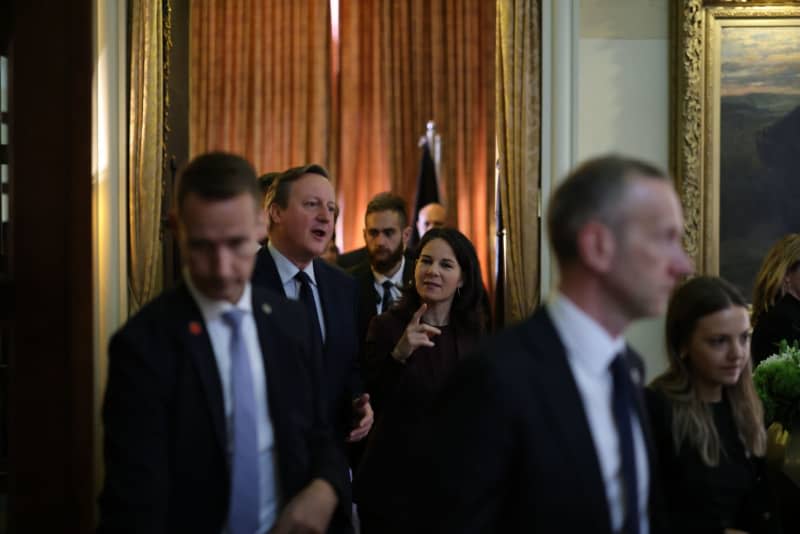Germany's Baerbock, UK's Cameron urge restraint in Iran-Israel row

- Oops!Something went wrong.Please try again later.
- Oops!Something went wrong.Please try again later.
- Oops!Something went wrong.Please try again later.
- Oops!Something went wrong.Please try again later.
German Foreign Minister Annalena Baerbock and her British counterpart David Cameron both called for restraint after holding crisis diplomacy talks in Israel amid fears that tensions with Iran could spiral out of control.
At Tel Aviv airport after meeting Israeli Prime Minister Benjamin Netanyahu and President Isaac Herzog, she again urged Israel to act prudently and responsibly in response to the Iranian attacks.
"I'm not talking about backing down here. I am talking about prudent restraint, which is nothing less than strength," she said.
At the centre of the discussions are fears that the ongoing war in the Gaza Strip could erupt into a major regional war. Iran launched significant air attacks on Israel on Saturday with hundreds of drones and missiles in response to a strike on the Iranian embassy compound in Damascus.
Israeli officials are now vowing a harsh counter-attack against Iran. Israel's allies worry such a response could fuel a spiral of violence and are urging restraint.
Baerbock met her Israeli counterpart Israel Katz during the visit, her seventh since the deadly October 7 attacks on Israel led by the Palestinian militant group Hamas.
Cameron spoke in Israel in favour of a measured response by Israel to Iran's recent attack.
He hopes the country responds in a way that "is smart, as well as tough," but that does not escalate the conflict.
Cameron said it was more important to concentrate on freeing the Israeli hostages, getting aid supplies into the Gaza Strip and achieving a ceasefire there. He said he planned to discuss this with the Israeli government and the Palestinian Authority.
But Netanyahu seemed implacable, saying: "I thank our friends for their support in defence of Israel and I say this – support in both words and deeds. They also have all kinds of suggestions and advice, which I appreciate; however, I would also like to clarify – we will make our decisions ourselves. The State of Israel will do whatever is necessary to defend itself."
Baerbock later called on Iran and Israel to show "maximum restraint" just after arriving on the Italian island of Capri before joining a meeting of the Group of Seven (G7) major industrialized democracies set to start on Thursday.
"A spiral of escalation would serve no one," Baerbock warned
Baerbock said that the aim was to prevent "the highly dangerous situation in the Middle East from turning into a regional conflagration."
She added: "As the G7, we speak with one voice: All players in the region are called upon to exercise maximum restraint."
The G7 talks, which run until Friday, are expected to focus on how to de-escalate the Iran-Israel conflict and Russia's war against Ukraine, which has been going on for more than two years.
Baerbock and Cameron arrived on Capri at around 8pm (1800 GMT) on board a special ferry from Naples. Immediately afterwards, a working dinner was planned behind closed doors to discuss cooperation with international partners.
Iranian President Ebrahim Raisi once again warned of a "devastating" response from his country should Israel carry out even the slightest "aggression" against Iran.
Tehran also described the seizure of a container ship with links to Israel, which happened a few hours before it launched its strike on Israel, as a "retaliatory measure," contrary to earlier statements.
It was a retaliatory action against the actions of the United States and Israel, Iranian Vice President Mohammad Dehghan said on Wednesday, according to the Iranian news agency IRNA, without giving details.
The Iranian Foreign Ministry had previously justified the confiscation with alleged violations of shipping regulations.
The navy of the Islamic Revolutionary Guards Corps (URGC) seized a cargo ship in the Gulf of Oman with links to Israel on Saturday and diverted it to Iranian waters.
The MSC Aries was travelling from the United Arab Emirates to India. According to the ship tracking service Marinetraffic, the freighter is now in Iranian waters off the island of Qeshm.
The Strait of Hormuz, an approximately 55-kilometre-wide strait between Iran and Oman, is considered one of the most important shipping routes for global oil exports.
The US regularly accuses the Iranian navy of obstructing civilian shipping traffic in the Strait of Hormuz and the neighbouring Gulf of Oman.


